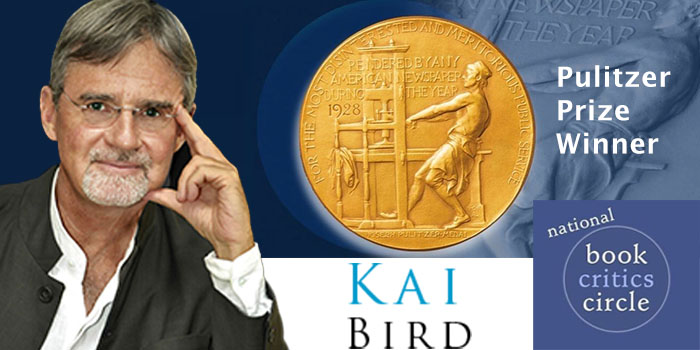Kai Bird's Book
Discover the books that have defined Kai Bird’s career. From in-depth biographies to historical narratives, each of Kai’s works offers a profound look at the events and people who have shaped our world.
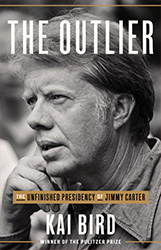
The Outlier: The Unfinished Presidency of Jimmy Carter
An essential re-evaluation of the complex triumphs and tragedies of Jimmy Carter's presidential legacy—from the expert biographer and Pulitzer Prize-winning author of American Prometheus. Jimmy Carter’s one-term presidency is often labeled a failure; indeed, many Americans view Carter as the only ex-president to have used the White House as a stepping-stone to greater achievements. But in retrospect the Carter political odyssey is a rich and human story, marked by both formidable accomplishments and painful political adversity.
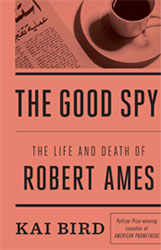
The Good Spy: The Life and Death of Robert Ames
On April 18, 1983, a truck bomb smashed into the American Embassy in Beirut, killing 63 people. The attack was a geopolitical turning point. It marked the beginning of Hezbollah as a political force, but even more importantly, it killed America’s most influential and effective intelligence officer in the Middle East – CIA operative Robert Ames. What set Ames apart from his peers was his extraordinary ability to form deep, meaningful connections with key Arab intelligence figures. Some intelligence operatives rely on threats and subterfuge, but Ames worked by building friendships and emphasizing shared values.
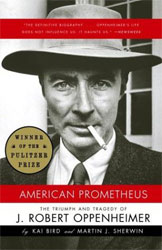
American Prometheus: The Triumph and Tragedy of J. Robert Oppenheimer
Kai Bird's and Martin J. Sherwin's biography of J. Robert Oppenheimer is a deeply researched and well-written examination of the life and politics of the man who directed the development of the atom bomb.
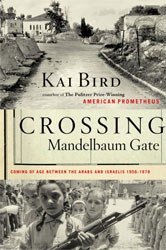
Crossing Mandelbaum Gate: Coming of Age Between the Arabs and Israelis, 1956-1978
Pulitzer Prize-winner Kai Bird's vivid memoir of an American childhood spent in the midst of the Arab-Israeli conflict in Jerusalem, Beirut, Cairo and Saudia Arabia. "I was entranced by this book from the first page to the last, and can recommend it with enthusiasm." Sir Martin Gilbert, is the official biographer of Sir Winston Churchill and author of Israel: A History, Jerusalem in the Twentieth Century and The Holocaust. "Kai Bird has done the impossible, and written a wholly original book challenging both the conventional and unconventional wisdom about Israel, the Jews and the Middle East." Victor S. Navasky, Editor Emeritus of The Nation.
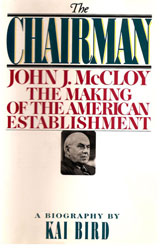
The Chairman: John J. McCloy & The Making of the American Establishment
In a 1962 spoof for Esquire, Richard Rovere quoted John Kenneth Galbraith as labeling John J. McCloy ``chairman of the US Establishment''--but McCloy has never been the subject of a full- dress biography. Bird fills this void with an evenhanded and wonderfully readable account of the public man that also sheds light on the inner workings of the American foreign policy establishment.
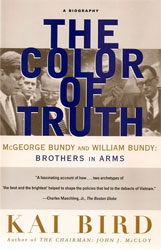
The Color of Truth: McGeorge Bundy and William Bundy: Brothers in Arms
The brothers McGeorge and William Bundy were brilliant, privileged and well connected--epitomes of the Eastern Establishment--and they attracted much of the blame for the Vietnam debacle. In the 1969s, ex-Harvard dean McGeorge Bundy was JFK's and LBJ's national security advisor, and his lanky older brother Bill was an assistant secretary of state. Drawing on numerous formerly classified documents, Kai Bird had written an intimate account of the decision-making that led to the Vietnam tragedy. It has become a classic account of the Vietnam War.
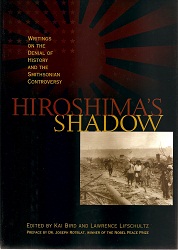
Hiroshima's Shadow, edited by Kai Bird & Lawrence Lifschultz: Writings on the Denial of History
An anthology of essays and documents about the decision to use the atomic bomb on Hiroshima. From Kirkus Reviews: "An exhaustive, controversial, and moving volume that has its origins in the Smithsonian Institution's cancellation of a planned exhibition in 1994-1995 of the Enola Gay, the plane that dropped the atomic bomb on Hiroshima.
